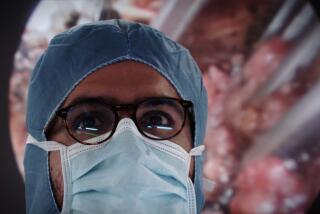Review: The biotech doc ‘Human Nature’ offers both hope — and caution
Some days, the miracles of biotech and gene therapy feel like “Brave New World” is around the corner, and other days — like these very days — their promise and power can’t come fast enough. The cloud of viral uncertainty we’re currently in makes Adam Bolt’s science documentary “Human Nature” an intriguing, mind-tingling watch as it tells the underreported story of CRISPR, the microorganism molecular system discovered in the 1980s, which revealed to the scientific world that DNA — the building blocks of our lives — can be targeted, snipped and repaired.
Viruses can then be located and stopped, and something like sickle cell can be eradicated, but also — if one’s imagination is invoked, money is deployed and subjects are willing — humans can be designed and cultivated like an attractive, pest-resistant crop. Bolt’s ethically engaging, easy-to-grasp and artfully conceived film covers a wide range of areas that stir us to think about benefits and costs.
His brainy interviewees — from CRISPR’s early discoverers and champions to the smiling entrepreneurs ready to help fix our aging, diseased bodies — are a personality-rich bunch whose recognition of how significant this is for future generations is presented with wonder, humor and sometimes a welcome pause.
There’s plenty of “What have we done?” and “Wow, what could we do?” to go around in “Human Nature,” which makes for a health swirl of amazement and caution. But as the world tries to right itself from the spread of an unseen global threat, it may very well be the amazement in Bolt’s film that viewers cling to most.
'Human Nature'
Not rated
Running time: 1 hour, 34 minutes
Playing: VOD and digital
More to Read
Only good movies
Get the Indie Focus newsletter, Mark Olsen's weekly guide to the world of cinema.
You may occasionally receive promotional content from the Los Angeles Times.










